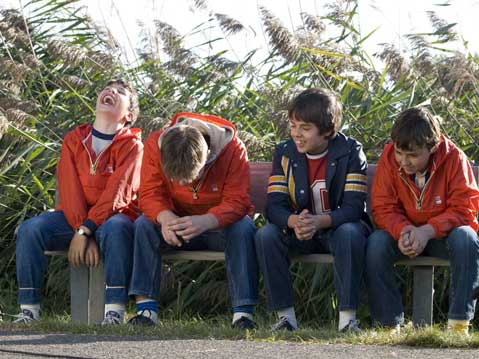Taking Cues from Quebec
It was pretty much Quebec day on Monday at SBIFF, with each screening timeslot (except for “Early Morning,” which is never a popular hole the morning after Super Bowl) offering a sample of what our French-Canadian filmmaking neighbors have been up to. I’d seen the thieves-try-to-go-straight-by-taking-a-pilgrimage comedy Sticky Fingers on Sunday night, so figured that head start made me uniquely qualified to suck down another five Québécois treats. What I got were a couple of parenting-minded comedies (1981 and Father and Guns), a parenting-minded dramedy (I Killed My Mother), the not-at-all funny Polytechnique (about a true 1989 Montreal college massacre), and the turn-of-the-century North African colonial standoff City of Shadows. They were each solid, engaging, occasionally great films, and a couple would probably be wildly popular in the United States, if Americans weren’t so afraid of reading subtitles. (They speak French in Quebec, silly.)

Why so many options from these French-speaking North Americans? Because “Focus on Quebec” is this year’s “special sidebar,” of course, with more than one dozen Québécois films — and plenty of more screenings to come this week. The special attention is because film festival director Roger Durling and top programmer Candace Schermerhorn have been noticing the region’s “burgeoning film industry” of for a few years. To test the waters in 2009, they brought to SBIFF the film Necessities of Life, whose resounding success was again confirmed on Monday at a mere mention of the movie. So when the two headed to the Toronto Film Festival this past year, Durling said they made a “concerted effort” to find films from Quebec.
“It came out of our cinematic curiousity — a need to explore something we knew nothing about,” explained Durling on Monday. “Just like their culture, these films have a North American sensitivity merged with an European sensibiity.” He’s particularly a fan of the French-Canadian use of cinema verite style and their emphasis on character.
Indeed, well-developed, colorful characters certainly stood out in the six Quebec films I saw — I’d be tempted to say “overly colorful” but I know some Quebeckers, and they’re a pretty colorful lot. Whether it’s conmen and their backstories (Sticky Fingers), oppressed tribesmen and their destinies (City of Shadows), or a sixth-grader trying to make friends and catch a girl (1981), the filmmakers don’t just throw in a character when needed to make a point or crack a joke. Each person on screen is fully fleshed out, and that can be done with dialogue, narration, or even just thoughtful cinematography — in fact, I don’t think the rebel mother in City of Shadows says one word in the film, but her beautiful image still haunts my mind.
Though these films may be considered “regional,” they don’t seem so tied to their homeland like many of the Eastern European or Asian offerings. Two of the six I watched this week were filmed outside of Canada : Sticky Fingers in Spain; City of Shadows in North Africa, and, last week, I also watched the screener of Last Train Home, an intensely personal documentary made by Quebeckers but focused on the interface between the annual migrations between city and countryside in China. Nor are they bound by convention — many of the films threw in animation, graphics, or other irregular techniques, always without warning and usually to positive effect.
There do seem to be some commonalities, however, and the juxtaposition of countryside to citylife seems to resonate in each, even for a brief outing in Polytechnique, which revolves almost entirely around the massacre at an engineering school in Montreal’s urban area. In fact, one could argue that each of the films — save, this time, for Polytechnique — revolve in some way around that relationship and the movements between the two lifestyles: boarding schools (I Killed My Mother), moving to the suburban woods (1981), hiking the trails of Spain (Sticky Fingers), the wilderness within a city (City of Shadows), enduring a camping retreat (Father and Guns). Based on the Quebeckers I know, this is no mistake, for they seem equally enamored with their endless forests as they are proud of Montreal’s many wonders.
This was not the only recurrent theme — the tension between parent and child was the basis of three out of six and a mix of laser-sharp tongue and biting wit rose to the surface in every one — but it’s wrong to give any impression that there’s anything obvious that ties these films together, other than they’re all from Quebec. They’re memorable films standing on their own, but together, their homeland truly shines on celluloid. I’m looking forward to completing the series.



